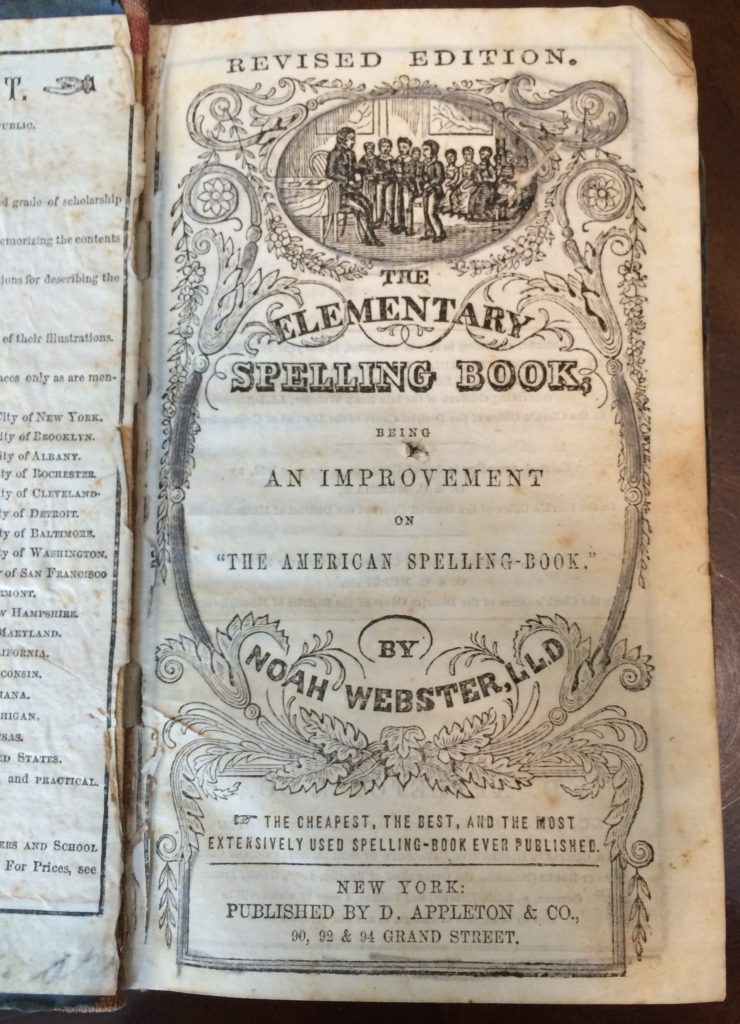(c) Connecticut Explored Inc. Spring 2005
Subscribe/Buy the Issue!
innovate: to introduce novelties; to make changes in anything established. It is often dangerous to innovate on the customs of a nation.
Noah Webster, American Dictionary of the English Language, Vol. 1, New Haven, 1841.
Noah Webster’s (1758 – 1843) legacy to the United States was a language rooted in the mother country, England, but which stood as uniquely American. In effect it helped define a new country; Webster willingly took on the customs of a nation, despite its danger.
Webster’s first innovation was his Grammatical Institute of the English Language (1783), commonly known as the Blue-backed Speller. Like many in his revolutionary generation, Webster believed that education ought to be the foundation of the new American nation. He further believed that a common language would help unite its people and enable the Dutch, French, German, Swedish, Gaelic, and English to live here together peacefully. As a schoolmaster in upstate New York, he realized he had to “demolish those odious distinctions of provincial dialects,” as he wrote in the introduction to the Grammatical Institute. Thus Webster’s speller was designed to teach children to read, write, and speak as Americans in a manner different from the widely used Dilworth’s speller from England.
Webster published An American Dictionary of the English Language, in 1828, after 17 years of work. In was innovative for its new spellings (e.g. favor for favour and risk for risqué) and “American” words. Although Webster’s desire to make English a common language for all of humanity did not come to fruition, he worked hard, though with limited success, to get Americans to pronounce words in the same way, as part of the emerging American identity.
The Blue-backed Speller sold over one million copies a year, yet during the time Webster was compiling his dictionary he needed a patron, John Jay, to keep him afloat. Without a copyright law, unscrupulous printers typeset and printed the Speller without Webster getting a penny for it. Webster lobbied hard for state copyright laws as a traveled around the 13 states selling his book. In 1790, Congress passed a national copyright bill giving authors copyrights for 14 years. To enforce this, Webster had to travel to each printer in each state to establish a contract. Finally in 1831, partly the result of Webster’s indefatigable 40-year effort, Congress passed a bill that ensured protection to writers for 28 years and then to their wives and children for 14 more years.
One of Webster’s most innovative, but least known, writings was his Sketches of American Policy (1785). In it Webster, at age 27, argued (two years before the Constitutional Convention) that the United States needed a stronger central government with an executive branch. George Washington and John Madison both read Sketches and corresponded with Webster about them. But as the years passed Webster fell out of step with American political trends, though he remained an abolitionist to the end. In the 1820s, he argued against universal manhood suffrage, believing the vote would be manipulated to the benefit of property holders who employed men who were both landless and dependent on them. In his last years Webster fell back on the principles of the long-dead Federalist Party to criticize the special interest politics of presidents Andrew Jackson and Martin Van Buren, which he believed would tear the country apart.
Nevertheless, Noah Webster’s linguistic innovations, as espoused in the Blue-backed Speller, his early call for a stronger central government, his dictionary with its American spellings, citations, and pronunciations all helped define the American identity.
Tracey Wilson teaches U.S. history and West Hartford history at Conard High School. She was recently named West Hartford’s town historian.
Explore!
“Noah Webster: Father of America Copyright Law,” Fall 2014
“Noah Webster: A Connecticut Yankee Doodle Dandy,” Spring 2003
“A Way with Wurds,” Winter 2020-2021
Noah Webster House & West Hartford Historical Society
227 South Main Street, West Hartford
noahwebsterhouse.org

